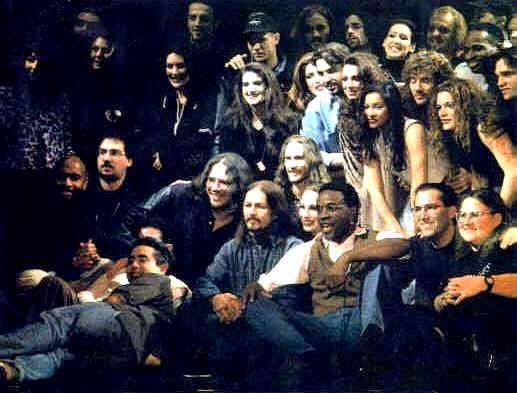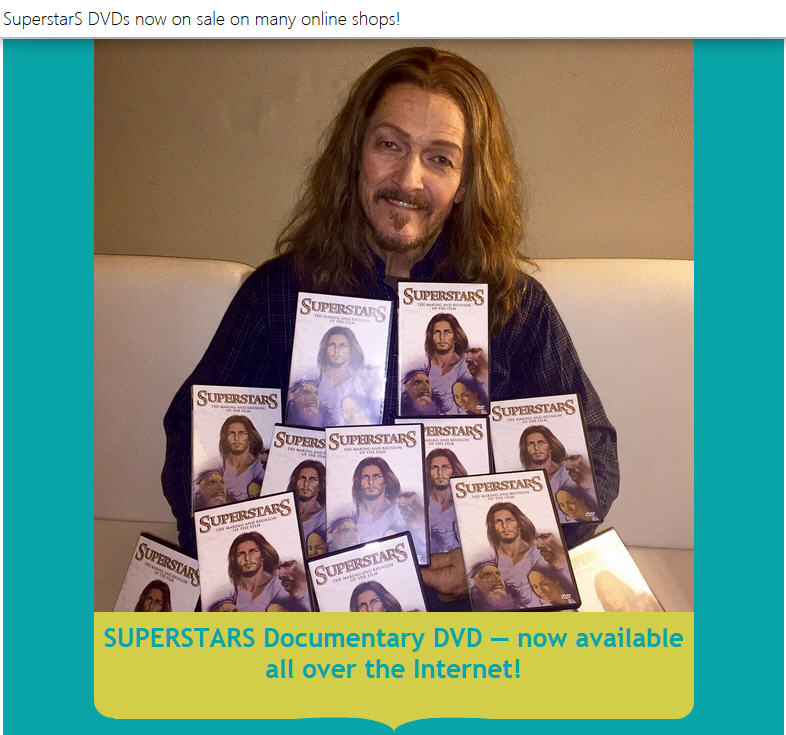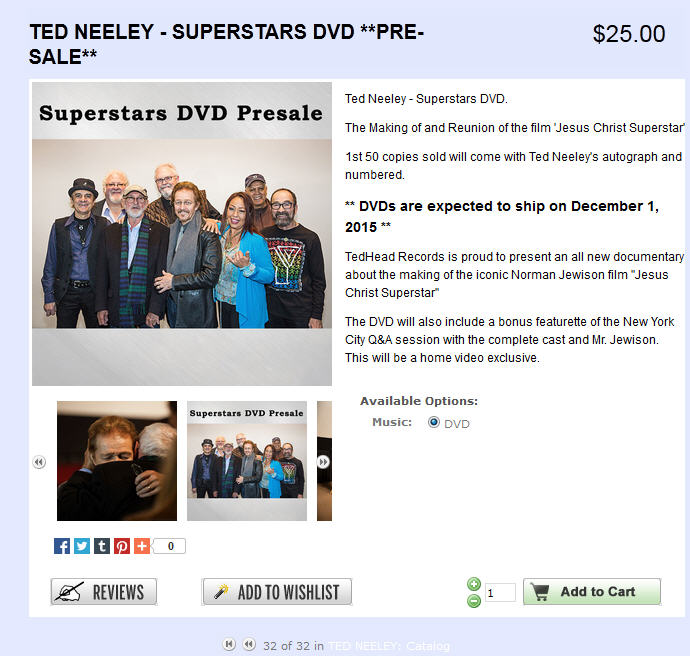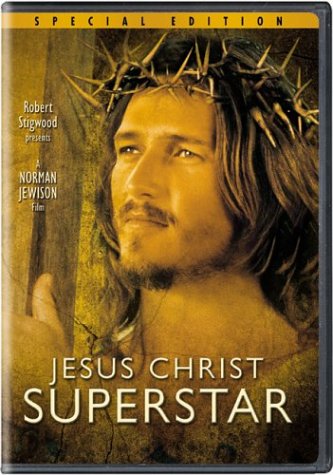


![]()


The cast of Jesus Christ Superstar during it's 4+-year tour.
Photo courtesy of Debbie Spykerman (spyk002@aol.com)
JESUS CHRIST SUPERSTAR
THE 1973 NORMAN JEWISON FILM
I can't say enough about Norman Jewison's BEAUTIFUL 1973 film of Jesus Christ Superstar. It brought Ted and Company to our attention, and has left a lasting statement to what ALW's material can be at its' best. On these pages you will find publicity articles and shots, film stills, and, on this page, a few things of interest having to do with the film itself. ENJOY!!!
You can find specific pages for the media shots and film stills at the following links:
SPECIAL SCREENING OF THE NEWLY REMASTERED DIGITAL WIDESCREEN VERSION OF JCS ON TCM!!!

UPDATE 6/27/16 (From Ted Neeley.com and Ted's Facebook Page)
CLICK ON TH E VIDEO/PICTURE LINK ABOVE TO CONNECT TO TED'S VIDEO!!!
CLICK ON THE PICTURE/LIN K BELOW TO GO TO THE TCM OVERVIEW PAGE!!!
NEW DOCUMENTARY ON THE MAKING OF THE JCS FILM AND CAST REUNION AVAILABLE!!!
UPDATE 1/8/16 (From Ted Neeley.com and Ted's Facebook Page)


UPDATE 12/11/15 (From Ted Neeley.com and Ted's Facebook Page)
![]()
![]()
![]()
In a Facebook and tedneeley.com update on 9/18/15, Ted has announced that there is a new documentary on the making of Norman Jewison's BRILLIANT 1973 film of Jesus Christ Superstar, and the cast/director reunion that happened this past April 27-28 at The Beekman Theatre in NYC. It is due to ship December 1, and the cost is only $25! See details below! ENJOY!
Pre-order at this link:

JESUS CHRIST SUPERSTAR SPECIAL EDITION WIDESCREEN DVD AVAILABLE!!!
Norman Jewison's BRILLIANT 1973 film of Jesus Christ Superstar has now been released in a special edition widescreen DVD with commentary by Ted and Norman Jewison included! Below is a shot of the DVD cover, some links to purchase it for lower prices and the commentary transcribed! ENJOY!

Laura Dacosta (dacosta4@sympatico.ca) from DaGirLS) found this info - thanks Laura:
INCLUDES:
Audio commentaries* with Director Norman Jewison and actor Ted Neeley (EEEE-HAH!)
Production Notes
Filmographies
Theatrical Trailer
2.35; 1 Anamorphic Widescreen transfer
Dolby Digital 5.1 Surround Track
Courtesy of (hnc62ngg@telecable.es), the latest info on this Special Edition DVD that we've been waiting for!
This DVD includes an interview/commentary with Ted and Norman Jewison. Here's the Amazon UR to order:
http://www.amazon.com/exec/obidos/ASIN/B00028HBIO/theunofficiacaro/103-9162020-0424623
|
Courtesy of Helena (hnc62ngg@telecable.es), here is another link to order the new Special Edition |
http://www.jcs.pair.com/index2.htm
|
FROM UNIVERSAL HOME VIDEO $14.95 CLICK HERE http://www.joblo.com/index.php?id=4295 (Joblo's Movie Emporium) Coolness #3 |
Mianne (mtripprn@hotmail.com) found the DVD at Empire for $8.99+ S&H:
http://www.dvdempire.com/Exec/v4_item.asp?userid=00000213259258&searchID=380516&item_id=607159
|
Lynne Freels (a.k.a. Moose) (lfreels@medmatrx.com) found the best deal on the DVD so far" $9.35 - WITH FREE SHIPPING at Deep DiscountDVD.com: |
Susan (Beachie) Kern (beachkern94@yahoo.com) found a great review of the new DVD here:
http://www.dvdtalk.com/reviews/read.php?ID=12025
|
UPDATE: 9/3/04: Lynne Freels (a.k.a. Moose) (lfreels@medmatrx.com) has graciously allowed me to post her DVD Spoilers e-mail here, for anyone for has not seen it on the list, and/or has not heard the DVD yet. Thanks Lynne:
I dislike surprises; so, for those of you who are unsure of whether or not you should purchase this special edition, here are my thoughts. > Firstly, and this comment is not a spoiler, there is a photos section that contains some magnificent stills from the productions of shots and angles I've never seen before. Just beautiful. Next, Ted and Norman (Jewison, the Director) comment together. They are both genuine in the expression of their memories regarding the making of this film. > > WARNING!!! SPOILERS BELOW!!! > > 1 > 2 > 3 > 4 > 5 > 6 > 7 > 8 > 9 > 10 > I was surprised at Ted's speaking voice. It's not quite what I imagined, but it's very pleasant to listen to. He speaks very softly, and his Texas accent emerges more when he's emotionally moved by something (whether it's a sad or humorous reminiscence). This accent is in contrast to Norman's Toronto, Canada accent ('aboot', and other slight Irish sounding words. No quintessential "eh", though). > It's interesting to note that, in addition to directing "Fiddler on the Roof", Norman had prior experience directing musical television (such as "The Judy Garland Show", amongst others. I love her voice, too). > Ted states that, when he heard that Norman was casting for the movie, he asked Norman to come see him perform in "Tommy". Norman obliged, driving from Los Angeles to someplace in Arizona (like driving from Edinburgh to Inverness in Scotland), only to discover that Ted wasn't performing that night. Ted explained that he had had a small accident that afternoon, and wasn't informed that Norman was enroute to see him. > There's been a lot of speculation by critics regarding the casting of Carl, an African-American, in the role of Judas. In Canada, especially during the time of the casting, there was no racial conflict; however, we were aware - via the media - of that problem in the States. Thus, Norman expressed to Carl his concern about racial condemnation by Americans. Carl asked him why he was chosen as Judas. When Norman replied, "Because of your talent", then Carl told the Director not to worry about how Americans would perceive his casting choice. > Relative to this, Ted recalled that, after a day of shooting the film, he and Carl would wind down by analyzing their characters. They were both raised in a Southern Baptist type of atmosphere; so, they knew the Bible backward and forward. However, they recognized the need (according to the libretto) to get away from these characters' divinity. They did that by pouring over the book "The Last Temptation of Christ": a still controversial story that also portrayed a deep friendship between Jesus and Judas. Remember, the humanity of Biblical characters had never been dealt with in film before; so, there was not much from which to cull inspiration. "Last Temptation ..." wasn't made into a film until 1988. > Their efforts were successful, judging by Ted's pleased comments regarding the fanbase and what he's heard from people like us. He pointed out that it was specifically Norman Jewison's vision that had a similar profound impact on his life as that of some of the fans with whom he's had the "pleasure of discussion". > Norman states that he constantly worried about people injuring themselves as they crawled around ruins and hills without any safety device. For instance, Ted was sitting in front of the camera during the filming of Judas' suicide when the rope broke. Happily, Ted moved fast and caught Carl before he fell over the edge of the tall cliff that you see in the pan-back shot (before it lowers to the setting of the Trial Before Pilate). > The worst accident occurred during the Trial scene, when one of choreographers fell off of the top of the amphitheatre. While he missed a large piece of equipment by inches, he broke his pelvis, collar bone, and leg. > Norman also had to hire extras for a few scenes. Ted related how he was almost truly crucified when the non-English speaking extra, who was playing the part of a Roman soldier, placed the nail on Ted's palm and was about to hammer it through skin and bone when Norman frantically yelled at the Arab to stop. > Regarding the crucifixion scene, they both elaborated a bit more on the coincidental weather change. That region had not had rain for years. When the cross was erected with Ted on it, a storm came upon the place very suddenly. Everyone ran for cover, and Ted was stuck there. > There was a curious silence from both of them during the death of Jesus scene (after he says, "Father, into your hands I commend my spirit", and then his head lolls slowly forward as he dies). Norman asked Ted what he was feeling at this point. Ted responded that he was trying to hold back tears. He reiterated again, how grateful he was to Norman for allowing him to be a part of a truly life-changing experience; but, this is where the impact of Carl's death hit him hard. You can hear the profound sorrow and loss in his voice. You don't have to see him to witness the impact of what he's feeling. He states three times in the commentary, "I miss you, Carl". The third time he utters it, he's not saying it to us. > Upon first listening to how Ted expresses himself, the jaded audience member will wonder if anyone could truly be that humble with, what would seem in today's overly-cynical world, that much philanthropy. As you listen more and more to his exchange with Norman, you come to understand that this is not a persona - a defensive mask. This is a rare honest display of self. Thus, Ted can tell Norman that he's "holding back sobs"; whereas, most actors would lie disingenuously. > Most actors? Most people, especially men. In patriarchal societies, men are expected to control, hide, or deny their emotions (except anger). Now, everyone is not the same; but, the simple societal expectation has a huge impact on self-conduct/definition. As a result, they act most of the time, rarely acknowledging that part of themselves that defines them as human. No offense intended, guys. Women, too, end up acting in ways they think is expected of them. What results is an unhealthy, unfulfilled bunch of individuals. > I really admire Ted for such a courageous display of honesty. |
|
UPDATE: 11/28/04: VIDEO COMMENTARIES Our Tedhead Family is a really amazing group of people. Recently, we've had a few new members join from Spain and Peru, who don't read or speak English as well as they would like, so some of our list members got out the DVD and decided to help make things easier for them. The result was a complete transcription of Ted and Norman's Commentary on the new JCS DVD. I did a little fine-tuning on the transcription, but the initial work was initially done by: DaSusan (Horlick), Lynne (Freels), Mark (Ellison) and especially Von (Thompson) and Maria (Grazia), who, I believe, did the bulk of the work. FABULOUS JOB GUYS!!!: OVERTURE Ted Neeley (T): Hello, hello, hello. That�s me and I�m proud to say that I love the idea that I�m sitting here with N.: This film was made from a two-record album, an L.P., because in those days, in 1972, when the film was made, 32 years ago, there were no video-cassettes. It was made from a long-playing album and it was an opera that was written by Andrew Lloyd Webber and Tim Rice, in N.: This is Yvonne Elliman, who plays Mary. T.: Oh, my goodness! Ha! N. That�s Joshua, Joshua Mostel T.: Oh, Carl. N.: And there's Carl. Anderson T.: You found that. N.: We built very little. Richard McDonald was the Producer Designer, who was just sensational, T.: Yes, he was. N.: and he decided that the film should be shot with existing locations, and we would add things to it. N. And, there you are, Ted! See, that was 32 years ago, you looked a lot more--- N.: How old were you there? T.: I think I was 28. N.: Oh, my God. T.: And, look at these guys climbing up that scaffolding, you know, that's why I said that to begin with. This scaffolding was so incredible that...
HEAVEN ON THEIR MINDS T.: Right! N.: Gosh! Look at what they put on now! T.: (Laughs) I think the key word in that is sack! N.: I must say Carl Anderson is - probably gave the performance of his life here, and, of course, the film has become a classic. But, unfortunately, we lost Carl only a month ago. He died very young, at the age of 58. T.: To come to see Tommy, yes. N.: To see you in it, yeah. And, you remember when I came?
WHAT�S THE BUZZ N. Larry Marshall , he�s playing Simon the Zealot. T. These, these, these were so incredible to be - that the atmosphere, within these caves was so incredible and having that single source of light coming from above, and how you were so careful about time of day to make sure we were certain... T. Oh, my God. N. Here's Yvonne Elliman. T.: There's Yvonne. N.: She comes from T. Olympic Studios.
Strange Thing Mystifying
T: Oh, Absolutely it's Judas all the way down the line. It's from Judas's point of view, he's the narrator; he keeps us connected with every single character. And the whole idea is that he's telling us from his point of view what he observed though the whole thing and it is called "Jesus Christ Superstar" The story is about Jesus, but it is Judas' concept of it. N: Concept of him being a superstar. T: Yes, Absolutely, and his whole philosophy is you letting your superstardom, so to speak, what you have accomplished, you're more concerned with that then what you are saying, you see. N: I love this dramatic conflict between Judas and Christ. I mean, this is what makes the relationship work in this film. Because good films are all about dramatic confrontation. And it's your performance with Carl that really is at the heart of the artistry of this film, in my opinion. T: Well, Thank you for allowing us to do that. N: I remember when I when I flew you both over to London for your screen test. T: That's right. N: Cause I told you I'd pretty well made up my mind about other people. But I wanted to see the both of you together. T: Yes and we were in the process of rehearsing for the Universal Amphitheater production of superstar here in L.A. When you flew us over for our screen test. N: Right, right. T: And uh, Carl and I had all that time on the plane to, shall we say, prepare for what we were going to do. 'Cause we both knew that you had someone else in mind for both roles. So, we were just going to go over there and have a great time and spend time with you and your crew. Great group of guys in the crew, just made us feel so welcome on the sound stage.
T: In what was there. N: In what was there, even the throne that's sitting there was real. T: Isn't this the ruin of Herod the Great's Castle. N: Yes, this was Herod's Castle. But, I can't remember where in Israel where we where. T: Well, we where way out in the middle of the country. Because I know that one point that you came up to me and said this particular sequence you were doing right here was going to take a while that day and if you want to go off for a while and just have some time, so I did. And I walked up at the top part of this ruin and I sat down and literally you could see all the way back to California. It was just desert no matter how far you looked. There was nothing. And I sit down there for a few minutes, Norman, just closed my eyes and thought: "Okay I'd better get myself focus for the next sequence" and when I opened my eyes, keep in mind I could see forever, when I opened my eyes there was a brunch of little kids, brunch of little local kids setting right in front of me looking at me. I thought I was hallucinating, I honestly did. There were a brunch of local kids who were part of this group of people that were coming though to look at the palace that day. The ruins that day. N: Well, the tourists, yeah, Yeah we even hired some of the tourists to be in the film I think, for some of the crowd scenes. T: Oh yeah, after a while there we became part of the ................. N: Now he was in, wasn't Bingham in the - , who plays Caiaphas... T: Yeah, Bob Bingham and Kurt Yaghijan there. N: Yeah, Bob Bingham, with that Bass that wonderful Bass voice T: Yeah N: Was he American or British? T: American N: He was American. T. Yes, both of these gentlemen were American. N: They were both American, but were they from the New York production? T: They were in the New York Company together. (Commenting on the scene) Oh, I love that. N: (commenting on Kurt Yaghijan's performance) He's wonderful isn't He? He is just wonderful. (about Bob Bingham) I love his face with kind of blue eyes it just - everyone said to me that well he supposed to be a high priest but he's got blue eyes. I said this is not biblically correct this is an opera. We have to go with the talent, with the voices.
EVERYTHING'S ALRIGHT N. Here was probably the prettiest melodic lines. And it's all acapella. Sweet voice. T. How great it was once again to be in these caves, just surrounded by that authenticity. N. The lady was so beautiful. T. It's good to be the King. |